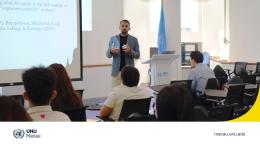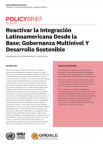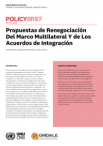On UN Day, the research and training institutes of the United Nations reaffirm their essential role in building an integrated, effective, and future-ready UN system that delivers real impact for people. This day invites reflection on the UN’s enduring mission to promote peace, development and human rights — and on how knowledge and learning buttress that mission.
The United Nations Interregional Crime and Justice Research Institute (UNICRI), the United Nations Institute for Training and Research (UNITAR), the United Nations Research Institute for Social Development (UNRISD), the United Nations System Staff College (UNSSC), the United Nations University (UNU), and the United Nations Institute for Disarmament Research (UNIDIR) each bring specialized expertise and unique perspectives to address the world’s most pressing challenges.
Knowledge that drives action
As the UN marks its 80th anniversary, the global landscape is marked by conflict, inequality and human rights violations, alongside transformative technological and social change. Achieving the Sustainable Development Goals (SDGs) requires more than ideas — it demands the ability to act on knowledge.
Effective training and capacity development turn research into skills, institutions and leadership that can deliver meaningful change. Governments need the tools to design evidence-based policies, institutions must operate efficiently and transparently, and communities should be empowered to adapt and innovate. UN reform efforts must therefore be purposeful, translating ambition into measurable improvements in people’s lives.
Building a cohesive research and learning ecosystem
A unified UN research and learning ecosystem is vital to advancing a just, sustainable and peaceful world — aligned with the 2030 Agenda, the Pact for the Future and the UN 2.0 transformation. This ecosystem links research, education, training and knowledge management to transform insight into action.
UN research provides credible, impartial evidence that informs policymaking, challenges harmful narratives and strengthens public trust. UN learning and training, in turn, are practical and competency-based, enabling decision-makers and practitioners to collaborate, innovate and adapt.
Emerging technologies, including artificial intelligence, offer new opportunities for data analysis and personalized learning. However, these advances must be paired with collective efforts to counter misinformation and ensure responsible use.
From knowledge to impact
Research and training are two interconnected functions. Policy-relevant research generates knowledge to inform decisions, while learning and training build the capacity to apply that knowledge effectively. Together, they form a bridge between the UN system, Member States and societies, turning evidence into tangible outcomes.
Externally, UN research informs national and international policy, contributes to norm-setting, and provides thought leadership on global challenges such as climate change, inequality, and peace and security. UN training and capacity development help individuals and institutions build the skills, mindsets and values needed for effective governance and sustainable development — ensuring knowledge translates into real-world impact.
Internally, these same functions strengthen the UN system itself. Research enhances evidence-based decision-making, foresight, and innovation, while learning fosters shared values, collaboration and agility. Together, they enable the UN to anticipate change, align efforts and deliver results more effectively.
A shared responsibility for the future
The UN’s research and training institutes work to shape an integrated and innovative UN system — one that can learn, adapt and lead in an era of complexity. Their collective work deepens understanding, informs policy and builds the capacity needed to achieve a peaceful, sustainable and equitable future.




